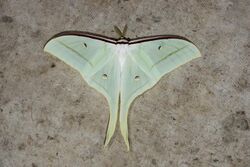Biology:Actias ningpoana
| Chinese moon moth | |
|---|---|

| |
| Adult male | |
| Scientific classification | |
| Domain: | Eukaryota |
| Kingdom: | Animalia |
| Phylum: | Arthropoda |
| Class: | Insecta |
| Order: | Lepidoptera |
| Family: | Saturniidae |
| Genus: | Actias |
| Species: | A. ningpoana
|
| Binomial name | |
| Actias ningpoana C. Felder & R. Felder, 1862
| |
Actias ningpoana, the Chinese moon moth, is a moth of the family Saturniidae. The species was first described by father-and-son entomologists Cajetan and Rudolf Felder in 1862.[1] It is quite large, and has long, curved, hindwing tails. There are many congeners across Asia; the Luna moth (A. luna) of Eastern Canada and the United States is a close relative.
Taxonomy
The taxon ningpoana Felder & Felder had been regarded as a subspecies of Actias selene until recently [3] and was elevated to species level in Ylla et al. (2005).[2]
Range
- China (Jilin, Liaoning, Hebei, Henan, Jiangsu, Zhejiang, Jiangxi, Hubei, Hunan, Fujian, Guangdong, Hong Kong, Hainan, Sichuan, Yunnan) (Zhu & Wang, 1996[3])
- Russia (far east) (Zolotuhin & Chuvilin, 2009[4])
- India- Western Ghats
Life cycle
Larva
Usually very fleshy with clumps of raised bristles.
Pupa
The pupa develops in a silken cocoon or in the soil.
Adult
Lacking functional mouthparts, the adult lifespan is measured in days. They have small heads, densely hairy bodies, and can have a wingspan ranging from 13 to 15 centimeters.
Host plants
In Hong Kong, A. ningpoana has been reared on camphor (Cinnamomum camphora) (Hill et al., 1982[5] as Arctias [sic] selene), sweetgum (Liquidambar formosana) (Barretto, 2004[6]), Hibiscus, Chinese tallow (Sapium sebiferum) and willow (Salix babylonica) (Yiu, 2006[7])
References
- ↑ Savela, Markku. "Actias ningpoana C. & R. Felder, 1862". http://www.nic.funet.fi/pub/sci/bio/life/insecta/lepidoptera/ditrysia/bombycoidea/saturniidae/saturniinae/actias/#ningpoana. Retrieved November 13, 2018.
- ↑ Ylla, J., R. S. Peigler & A. Y. Kawahara (2005). "Cladistic analysis of moon moths using morphology, molecules, and behaviour: Actias Leach, 1815; Argema Wallengren, 1858; Graellsia Grote, 1896 (Lepidoptera: Saturniidae)". SHILAP Revista de Lepidopterología. 33: 299-317.
- ↑ Zhu, H. F. & L. Y. Wang, 1996. Fauna Sinica Insecta 5 Lepidoptera: Bombycidae, Saturniidae, Thyrididae. Beijing: Sciences Press. x + 302 pp. ISBN:7-03-004551-3
- ↑ Zolotuhin, V. V. & A. V. Chuvilin, 2009. On the species compound of the genus Actias Leach, 1815 (Lepidoptera: Saturniidae) of Russia. Eversmannia 19:21-31 [1]
- ↑ Hill, D. S., P. Hore & I. W. B. Thornton, 1982. Insects of Hong Kong. Hong Kong: Hong Kong University Press. xxv + 502 pp. ISBN:962-209-008-7
- ↑ Barretto, G. D'A., 2004. Check list of plants at Kadoorie Farm and Botanic Garden. Hong Kong: Kadoorie Farm and Botanic Garden Corporation. xxviii + 232 pp. ISBN:962-8869-04-3 [2]
- ↑ Yiu, V., 2006. Insecta Hongkongica. Hong Kong: Hong Kong Lepidopterists' Society & Hong Kong Discovery. 656 pp.
Wikidata ☰ Q1015540 entry
 |

